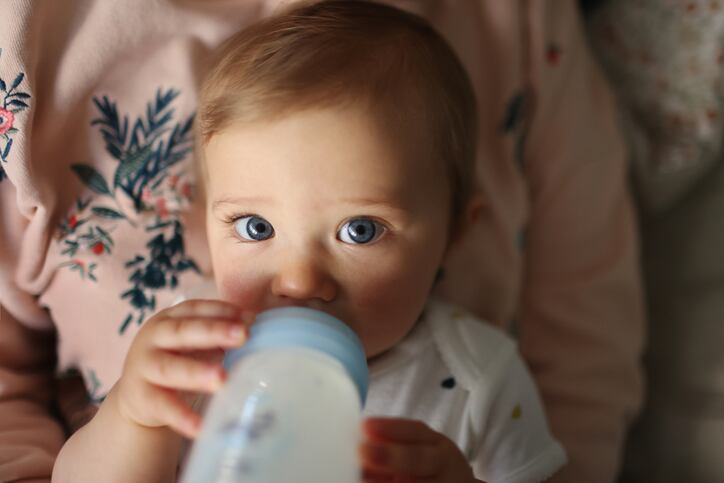The study, published in Pediatric Allergy & Immunology, reports that targeted probiotic supplementation, guided by microbiome testing, may shift infant gut profiles and deliver tangible health benefits, especially among babies born via cesarean section.
The research, conducted by microbiome health company Tiny Health, demonstrated that infants who received personalized gut health recommendations had 83% lower odds of developing eczema compared to controls. The intervention included at-home microbiome testing, strain-specific probiotic recommendations and parental education on gut health and immune development.
Study design and peer-reviewed validation
The randomized controlled study focused on the gut microbiomes of infants born via C-section, who are known to have higher risk for allergic and chronic inflammatory conditions.
“Infants born via C-section often exhibit distinct gut microbiome composition and are at higher risk of developing atopic conditions and have elevated risk of chronic inflammatory conditions later in life,” the authors wrote.
The study also noted that the intervention led to “notable shifts in both microbial taxonomy and functions,” bringing the microbiomes of C-section infants closer to those of vaginally born infants. It also resulted in “fewer reports of atopic conditions,” including eczema.
“Publishing in such a respected journal validates that our findings stand up to scientific scrutiny,” Cheryl Sew Hoy, CEO of Tiny Health, told NutraIngredients. “What makes this study unique is its personalized approach—the intervention targets each baby’s individual microbiome, unlike the few studies out there on specific probiotics or formulas.”
Dr. Elisa Song, pediatrician and study collaborator, told NI that the publication helps bridge science and practice.
“This publication brings our results to the very clinicians who care for babies most at risk for allergic disease,” she said. “That’s how change happens in real-world medicine—by giving parents and pediatricians practical tools to shift the trajectory of a child’s health right from the start.”
Microbiome testing: A critical link for product efficacy
For supplement manufacturers, the findings spotlight both a need and an opportunity: developing precision-formulated products guided by real infant microbiome data. Sew Hoy shared that the results reflect her own experience as a mother.
“One of my three children was born via C-section and had eczema and food sensitivities, which ultimately drove me to found Tiny Health,” she said.
She noted that 41.6% of babies in Tiny Health’s database were taking incorrect probiotics for their microbiome profile, while 77.6% of parents changed their baby’s probiotics after testing.
“Without testing, we’re essentially supplementing blindly, which can be ineffective or even create new imbalances,” Sew Hoy said.
The study also found that 64% of infants in the intervention arm took Bifidobacterium-containing probiotics during the study period, compared to just 3% in the control group. These targeted strains contributed to a “notable increase in B. infantis,” a beneficial species key to immune system development.
“B. infantis is able to comprehensively degrade HMOs [Human Milk Oligosaccharides] from breast milk,” the researchers reported, leading to beneficial metabolite production and immune system maturation.
Intervention drives age-appropriate gut maturation
The authors also reported a decrease in genes associated with butyrate production in the intervention arm. While initially counterintuitive, this drop aligns with natural infant gut development.
“We believe this reduction brought butyrate gene abundance into a range that likely reflects the normal developmental stage of the infant gut microbiome,” they wrote. Butyrate-producing bacteria generally rise after the introduction of solid foods, and their early overabundance has been linked to higher risk of asthma and atopic dermatitis.
Dr. Song emphasized the potential to reduce future disease burden.
“An 83% reduction in eczema developing in the intervention group is extraordinary,” she said. “To have an intervention that could dramatically reduce those numbers isn’t just important statistically; it’s potentially life-changing for families.”
In one modeled scenario, she noted, a practice with 1,000 pediatric patients could see 260 fewer cases of eczema with this approach.
Breastfeeding and bacterial diversity
Breastfeeding also played a major role in the microbial shifts observed.
“Most infants were exclusively breastfed,” the authors noted, adding that this likely contributed to a reduction in Enterobacteriaceae and an increase in Bifidobacterium in both study arms.
However, not all breastfed infants may fully benefit, as “effective HMO degradation depends on the presence of specific Bifidobacterium species.”
The increase in B. infantis, paired with lower alpha diversity in the intervention group, was interpreted as a favorable shift toward a more specialized and age-appropriate microbial community by the study authors.
From clinical research to product pipelines
The Tiny Health team is already working with stakeholders to scale the findings.
“We’re actively partnering with manufacturers, health systems and practitioners—with physicians at Massachusetts General, Kaiser, Mayo Clinic and the Penny George Institute for Health and Healing,” Sew Hoy said. “We’re the only at-home test that tracks probiotic colonization at the strain level.”
She sees a shift underway from generic probiotics to evidence-based, precision-formulated solutions.
“Companies that invest in clinical validation through infant microbiome testing and develop strain-specific products can build the evidence base that earns trust from both parents and pediatricians,” Sew Hoy said.
Dr. Song agreed that practical application is the next frontier.
“The supplement industry must commit to products that are safe, transparent and backed by real infant data,” she said. “Testing helps us move from guessing to knowing.”
While the authors acknowledged limitations, including small sample size and a short follow-up period, they wrote, “we view the levels of statistical significance of the presented findings in this small human cohort as remarkable and highly encouraging for the field.”
Source: Pediatric Allergy & Immunology, 2025; 36:e70182. doi: 10.1111/pai.70182. “Improving immune-related health outcomes post-cesarean birth with a gut microbiome-based program: A randomized controlled trial”. Authors: Nieto, P. et al.





